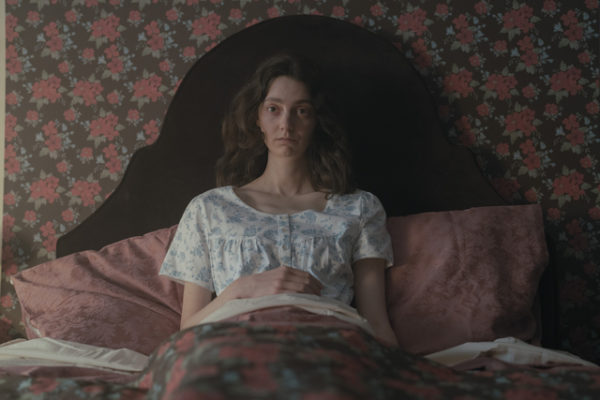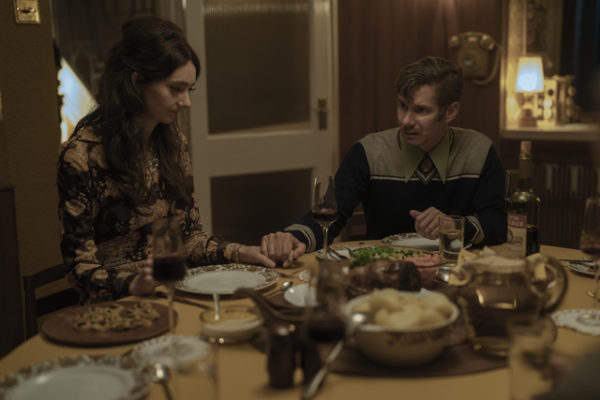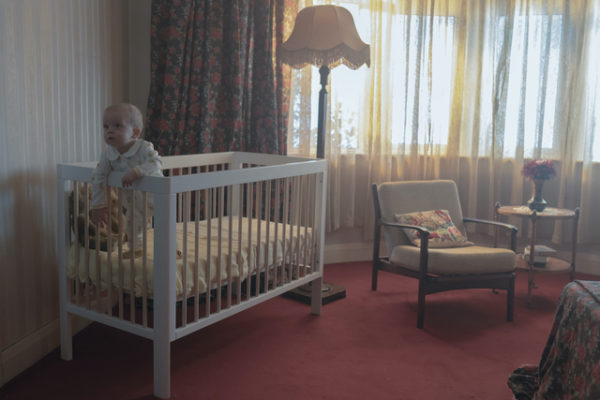
As HBO’s The Baby moves into its back half, the show makes the daring decision to leave behind Natasha, Mrs Eaves, Bobbi and Barbara for an episode-long character study of the titular child’s mother.
Spoilers follow for episode five…
Missed a Review? Episode 1 I 2 I 3 I 4
Episode 5 “The Baby”: As Natasha and Mrs. Eaves remain trapped in Barbara’s summer solstice ritual, the baby’s complicated origin, connection to Mrs. Eaves, and trauma-filled path to Natasha are revealed.
It’s a bit ironic that “The Baby” aired this week, given that Shining Girls’ most recent episode literally just broke from formula in the same way. Here the mysterious origin of the killer baby is revealed in a one-off story set in the 70s where the true horror is not a child’s penchant for killing its surrogate mothers, but rather the treatment of women and LGBTQIA.
It takes a hot second to adjust to the change in time period and the complete absence of our usual series regulars, but the stilted life of housewife and secret lesbian Helen McGregor (Sex Education‘s Tanya Reynolds) quickly draws us in. “The Baby” opens on a horrendous dinner party in which Helen must suffer the company of her oaf of a husband Jack (Karl Davies), his ill, boorish father Fred (David Burnett) and chipper/maternal friend Judy (Eleanor Barrett). The look of muted horror on Helen’s face when she feels Judy’s pregnant belly tells us everything we need to know about Helen…until she takes a phone call from Nour (Seyan Sarvan) and it becomes clear that Helen is far more unhappy and repressed than she initially seemed.
The secret lovers make a plan to escape that evening, but first Jack guilts his wife into sex over his father’s fatal cancer diagnosis. And just like that, Helen becomes pregnant.
Returning director Faraz Shariat, working from a script by Kara Smith, lays bare the horror of Helen’s double life in multiple ways: not only are the interiors of the perfect heterosexual house shot in dutch angle, with emphasis on locked doors and rain streaked windows, but the episode regularly features body horror sequences from inside Helen’s womb, complete with a squishy wet sound design. It’s confronting, invasive and accurately captures the weirdness of both pregnancy and the human body more generally. (These shots are also evocative of New French Extremity film A L’Interieur/Inside, which similarly tackles the horrors of pregnancy)

The basic reality of the episode is that as a woman and a closeted lesbian, Helen has no power over her autonomy or her body. Despite finding a haven with Nour and a safe house of (admittedly judgey) lesbian friends, Helen is never safe from Jack or his wealthy father, who send the cops to beat on the door, get Helen fired from her Conservative library job and eventually abduct her from an abortion clinic and force her to carry the baby to term.
It’s impossible not to think about the targeted real world attacks on both the LGBTQIA community, reproductive health and abortion occurring right now. Smith’s script sneaks in nefarious references to queer women being imprisoned for their sexuality, and the supportive lesbian community that Helen and Nour seek shelter in ultimately can’t protect her because they’re under additional scrutiny by social workers and police because they are queers with children on the premises.
While “The Baby” is set in the past, none of these issues feel removed from the current reality of the present, which only serves to make it more horrifying.
Naturally – because this is a horror series – Helen retaliates in bloody “Good for Her” fashion: in a subtle move, Helen weaponizes traditionally domestic/feminine objects and spaces when she stabs Judy in the neck with a knitting needle and pushes Jack down the stairs. Alas the supernatural power of the Baby (Albie Pascal Hills and Arthur Levi Hills) means that the poor woman can’t escape from her socially-imposed prison: Helen eventually drowns in an apparent suicide outside of the cabin first glimpsed in the opening of episode one, starting off the vicious murder cycle that has persisted ever since.

Other Observations:
- Is the implication that the Baby’s unnatural abilities and eternal youth are the result of Nour’s curse on Jack and his family? If so, there’s some questionable racial commentary being made here that hopefully The Baby will unpack at a later date.
- It’s hard not to draw a line from the experiences of lesbian mothers of the past directly back to Bobbi (Amber Grappy)’s adoption challenges in the present day. Queer people struggled with rights and freedoms then, and continue to do so now.
- Throwing glass jars full of pee at police officers is pretty funny (“Piss off!”), but wouldn’t that give them even more authority to break in?
- The montage of Helen’s imprisonment – edited like snap shots as time passes while Shariat slowly pushes the camera in through the looming, ominous bedroom door – is chilling and incredibly effective.
- Finally, kudos to Reynolds for her devastating performance as Helen, particularly the later scenes of the episode when the character essentially goes into a fugue state while she is held captive and made to give birth.
The Baby airs Sundays on HBO